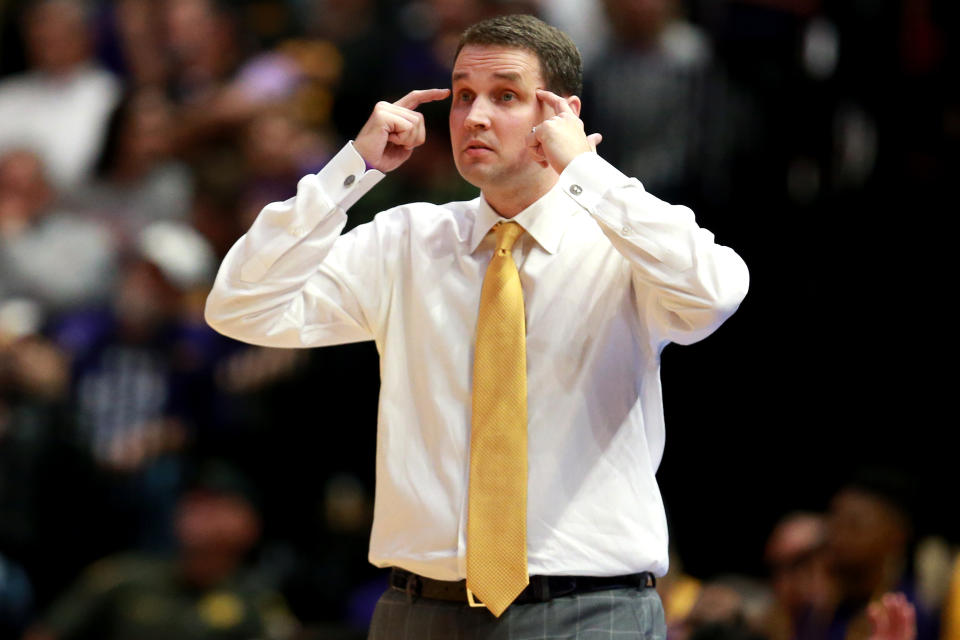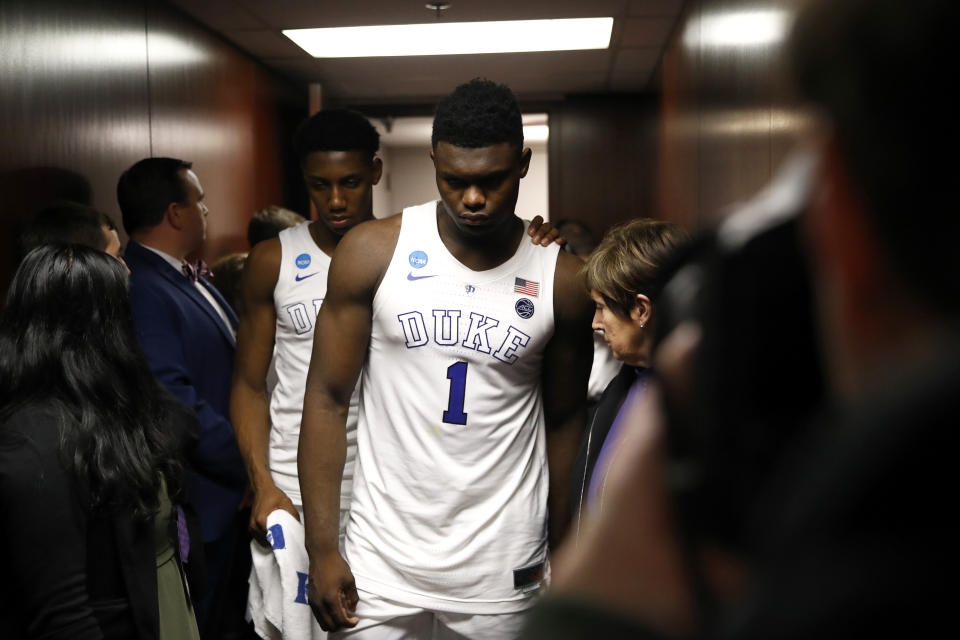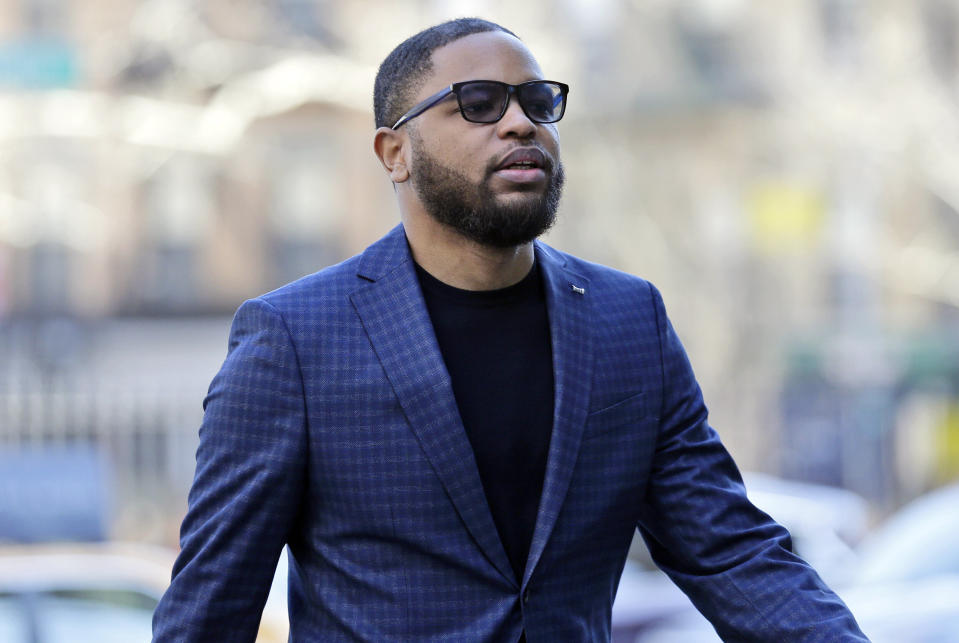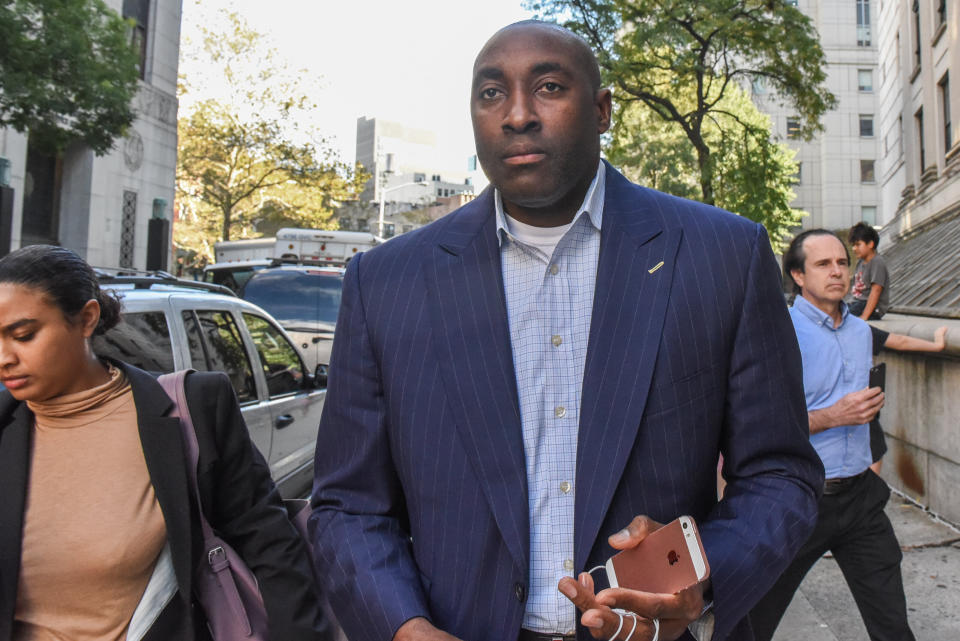What's next in hoops corruption trial? Here are 6 key issues remaining
NEW YORK — The evidentiary portion of college basketball’s federal bribery trial ended here on Thursday afternoon. Closing arguments will stretch across Friday and Monday, at which time a jury of 12 will determine whether defendants Christian Dawkins and Merl Code bribed college basketball coaches.
More than 19 months ago, the sport of basketball — from the NBA and its players union straight down through grassroots — was rocked by the arrest of 10 men, including four college assistant coaches, following a three-year FBI sting. At the time, the U.S. Attorney’s Office for the Southern District of New York promised a massive crackdown on the sport in an ongoing investigation.
Some coaches were fired, plea deals were made and now two trials have mostly played out (a third, if it occurs later this summer, is expected to yield little new information). Yet the sport has mostly churned on.
Here’s a look at six of the most discussed issues that are currently in doubt.

Sean Miller and Arizona
There will be no clear closure for Arizona and its head coach Sean Miller. Multiple people alleged in the past three days that Miller was paying money, or was willing to pay money, to players, their families and/or their handlers.
As recently as Wednesday, Miller’s longtime chief assistant, Emanuel “Book” Richardson, who was indicted and pleaded guilty in this case, said on an FBI-recorded phone conversation with Dawkins that Miller was paying star big man Deandre Ayton $10,000 a month.
There were other stories of Miller paying out money, not to mention Richardson’s guilty plea, which at the very least is bad optics for the program. Richardson is repeatedly on wiretaps discussing payments, deals and schemes to push players to specific agents in exchange for money. In one wiretap discussion played on Wednesday, Dawkins and Code indicated that they wouldn’t discuss the details of a deal with a certain Arizona assistant (Mark Phelps) and found another “annoying” (Joe Pasternack) because he was so relentless. Phelps has been removed from his position and Pasternack is the head coach at UC-Santa Barbara.
Despite the existence of FBI-intercepted calls between Miller and Dawkins, Miller’s voice was not heard in this trial. The prosecution decided not play them, likely out of relevancy. Despite the early proclamations, the government’s goal here was to win convictions, not expose college hoops.
Likewise, Miller fended off a defense subpoena seeking him to come to New York to testify, an act that would have created a circus.
Arizona has stood by Miller, its 10-year coach, throughout it all; Miller sat out just one game in 2017 after an ESPN report came out concerning one of the taped phone calls. Despite failing to make the NCAA tournament this year, he is set to welcome a top-five recruiting class to Tucson for the 2019-20 season.
What does Arizona do now? Maybe no one knows. Both a university attorney and outside counsel took in portions of the second trial. When exhibits from the trial eventually are made public, university officials will be able to hear conversations involving Dawkins and Richardson themselves and assess culpability. Those conversations came without either knowing they were being recorded by the FBI, which lends credibility.
Is that enough? Is the fear that tapes involving Miller will eventually come out enough to scare Arizona? Or is it status quo for Miller, who may continue on with his job but never find any measure of exoneration?

Will Wade and LSU
On three different occasions, it was inferred that LSU coach Will Wade paid for a recruit. Last week, on a recorded conversation, Richardson told Dawkins that he and Wade discussed the recruitment of future Tigers star Naz Reid, who both Arizona and LSU were recruiting.
“Look, there’s a deal in place, I got $300,000 for him,” Richardson said Wade told him.
In last October’s first trial, a transcript of a call featuring Wade and Dawkins was read by defense attorney Casey Donnelly that included Wade saying, “I can get you what you need,” in relation to recruit Balsa Koprivica. Donnelly later said “need” meant “money.”
Yahoo Sports reported in March that Wade is on a separate call with Dawkins discussing a “strong-ass offer” he made to the handler of future LSU guard Javonte Smart.
New LSU athletic director Scott Woodward starts his job Monday. While there has been continued evidence against Wade, Woodward faces a tricky decision.
Wade led the Tigers to their best season in a decade, as LSU won the SEC and reached the Sweet 16 of the NCAA tournament. Wade was suspended for the final game of the regular season and postseason, in part because he didn’t meet with school officials to discuss the Yahoo story for more than a month.
Wade is back as head coach. And Woodward has to decide if he wants to hitch his wagon to a coach whose success has come with a cloud of suspicion and a flurry of allegations. Athletic directors tend to trend conservative, and the feeling around the SEC and NCAA is a sense of disbelief that Wade has lasted this long. Firing Wade wouldn’t be popular with Woodward’s fan base. But would it be considered the most pragmatic administrative move to start a career in lockstep with a coach linked to so many instances of trouble?

Unpulled Strings
Because the goal of the trials was to win convictions or acquittals and because the nature of federal court — with procedures, evidentiary rulings and relevancy restrictions — there are about a million topics that were broached, but never truly explored.
Zion Williamson, for example, was brought up multiple times across two trials, with the suggestion that at least one member of his family sought money, a job and a house. Yet it rarely went any further. It’s likely the public will never know what, if anything, brought the sensation to Duke.
Likewise, October’s trial brought multiple references to an “astronomical offer” that Dawkins and Code believed Oregon made to sign Brian Bowen, but his father punted on that when asked about it on the stand. This week, a tape was played of Dawkins and Richardson discussing their belief that the price to sign Bol Bol, who wound up at Oregon, was $200,000. Again, there was nothing more than that.
That’s either a lot of inaccurate speculation about the Ducks program, or coach Dana Altman dodged a bullet and will continue on in Eugene.
There are a lot of unexplored or unresolved allegations involving dozens of schools.
On the other side of things, the University of Miami was one of four schools (Kansas, Louisville and North Carolina State were the others) that appeared in the initial indictments, causing major consternation in Coral Gables. However, by the end the school was removed from the case and little more than cursory references to the Hurricanes came up.
While few might recall schools such as Oregon or Creighton having anything to do with the case, they turned out to have far more than Miami, which might be forever linked for apparently no major reason.
Then there is the big one … Nike, which nearly everyone in the sport believes operates in a similar fashion, yet on a bigger scale, as Adidas. Yet it was Adidas executive James Gatto and consultant Merl Code who were convicted in October in a trial that dragged Adidas’ top schools — Kansas, Louisville and N.C. State — into the fray.
Publicly, at least, there is no indication either the Southern District of New York or the FBI is investigating Nike the way it did Adidas, even with the constant shouting of attorney Michael Avenatti, who was indicted for allegedly attempting to blackmail the shoe company with information of improprieties.
If a federal investigation of this scope and magnitude into grassroots basketball ends without any direct ties to Nike … well, that would be quite a swing and a miss by the government.

The second trial
The jury is expected to get the case on Monday and will determine the guilt of Code and Dawkins. Whereas both men were convicted in October’s trial and sentenced to six months in federal prison, the stakes aren’t enormously high. It’s quite possible that even if found guilty this time on bribery charges, their sentence in this case will be of a similar length and run concurrent.
Still, both would like to avoid finding out. They are also both appealing their prior conviction and remain free as that works through the system.
So, can either of them actually win?
Despite the understanding that the feds rarely lose, there is certainly a very compelling case that Code could get a not-guilty verdict. His role in the alleged bribing of college assistant coaches is peripheral at best, as he basically helped set up some meetings with coaches who weren’t actually bribed.
He barely knew and rarely spoke with anyone other than Dawkins and expressed doubt at the idea, pushed by an undercover FBI agent named Jeff DeAngelo, that paying college assistant coaches was a good way to secure future NBA clients to their agency.
Code, 45, didn’t even bother to present a defense on Thursday — mainly because other than calling himself as a witness, there was no one that could have helped. It’s tough to prove a negative, as they say.
There is way more evidence against Dawkins, 26, and the prospect of anything but a conviction was remote as recently as Wednesday. However, he took the stand in his own defense and sharply made his case that he never wanted to bribe college coaches and only did so under pressure from an investor in his company, who just happened to be an undercover FBI agent. Bank records even show that some of the alleged “bribes” were actually returned to Dawkins and reinvested in the company.
He certainly has an argument. Maybe even better for him, he came across extremely well on the witness stand while never giving up any incriminating details on any college coaches, even when the chance to unload on Miller, in particular, was available.
In the end, he made a forceful argument for fairly compensating college athletes all while lampooning his two arch-enemies — the NCAA and FBI.
He may not win in the end, but Christian Dawkins went out swinging.

NCAA enforcement
The end of this trial can be considered the metaphorical hand-off from the federal portion of this case to the NCAA portion of it. There’s still one potential trial remaining, that of clothier Rashan Michel, the suit-making middleman who faces bribery and wire fraud charges.
In the micro, the NCAA will learn from the federal government when the NCAA’s enforcement staff can begin fully investigating these cases. That will happen only when the federal investigations are completely done, but that shift is expected sooner than later. The NCAA will face an enormous task in scope and scale — there’s a lot of pressure for real results from the coaching establishment.
One Power Five coach summed up the situation this way on Thursday to Yahoo Sports: “People in our business are laughing. What is going on? All of us who said, ‘Hey, we’re going to follow the letter of the law.’ Are we just all idiots? Why are we doing this?’”
The NCAA has been handcuffed, and the shortest timeframe for any significant results coming from the NCAA investigations will be at least a year. Some of the cases going more than two years wouldn’t be surprising.
“At some point here, all of us are wondering when is decisive action going to be taken,” the coach said. “The schools have to answer as well. I don’t want to put this just on the NCAA. I feel like so many people in our positions feel like there’s a weakness that’s come across here, both by the universities and the NCAA.”
In one of the more humorous moments in court this week, Dawkins declared: “Everything is in violation of NCAA rules.” Now the onus shifts to the NCAA to see if it can enforce them.
The NBA Players Association
The NBA agent world did not have a flattering week in court, as testimony by Christian Dawkins essentially painted the picture of a world where agents are ruthlessly competing to buy top high school players. He described the competition to sign players as “ferocious,” a cutthroat underworld where buying players was commonplace. Dawkins learned that world while working and recruiting for former NBA agent Andy Miller. “I have nothing to hide from that standpoint,” Dawkins said. “Everybody was paying players.” He added that there’s “no one” signing players that “isn’t paying for people.”
Three officials from the National Basketball Players Association attended part of the testimony on Thursday. That’s the association that’s in charge of regulating the NBA agent world. There were multiple mentions on Wednesday and Thursday to Seth Cohen, an obscure basketball agent who was allegedly paying $13,000 to former South Carolina assistant coach Lamont Evans in an effort to recruit P.J. Dozier. (Cohen declined comment when reached by Yahoo Sports on Thursday.) According to Cohen’s client list on RealGM, he doesn’t have a current NBA player on his client roster, which is indicative of how competitive that world is (Dozier signed with Bill Duffy).
“Since the indictments in September 2017, the NBPA has monitored the proceedings related to the FBI investigation and will continue to do so in the future,” the NBPA said in a statement to Yahoo Sports. “Further, we stand ready to investigate any actionable information that we receive regarding improper conduct of certified agents.”
In the wake of the initial arrests, Andy Miller relinquished his certification to represent NBA players in December of 2017.
More from Yahoo Sports:
